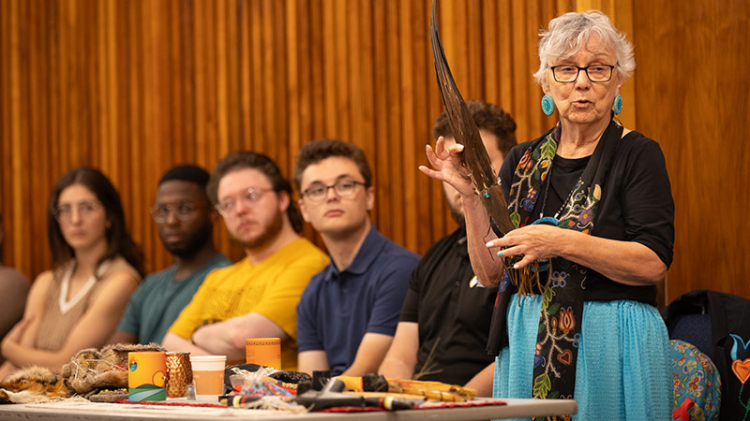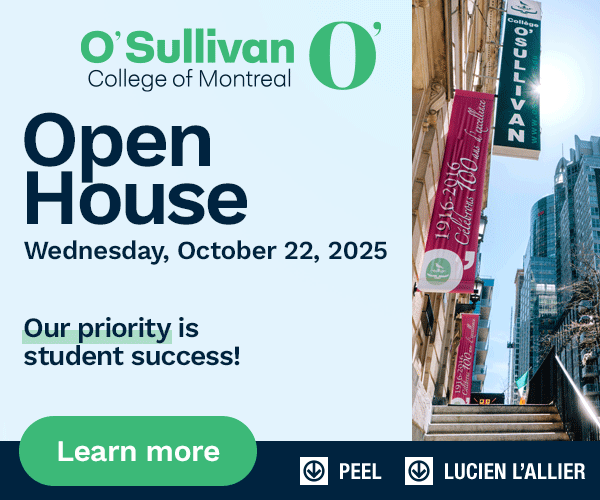At the University of New Brunswick (UNB), the path to becoming a lawyer now begins with honouring Indigenous traditions and confronting unconscious bias.

Wabanaki Elders and an equity advocate led sessions for first-year law students that encouraged reflection on history, privilege and cultural knowledge, offering a transformative start to their legal education and a broader view of justice.
On Sept. 4 at the Wu Conference Centre on the Fredericton campus, orientation sessions for first-year law students were conducted to challenge assumptions and broaden perspectives in Indigenous ceremony and tradition as well as in equity, diversity and inclusion (EDI).
Indigenous teachings
Split into two groups, students learned Indigenous cultural teachings led by Mi'gmaw Elder Noel Milliea in the morning and Wolastoqiyik Elder Opolahsomuwehs (Imelda Perley)(BA'94, MEd'02) in the afternoon. Wolastoqiyik Elder Graydon Nicholas (LLB'71), a former lieutenant-governor of New Brunswick, assisted both sessions.
"Opolahsomuwehs was the name my grandmother gave me," Elder Perley said, explaining it means "Moon of the Whirling Wind" in Wolastoqey, because she was born in January.
"I wasn't allowed to use it in school. I was told by the teachers of the day, the nuns, that it is not a real name. We're going to give you a real name.' And so, my colonial name is Imelda," Perley said.
Perley's talk focused on the importance of preserving Indigenous languages, ceremonies and medicines. Students were allowed to touch and examine the medicines, as well as the pipes and wampum belt.
She spoke of the symbolism of the sacred pipe and wampum belts in treaty-making, urging students to advocate for Indigenous rights and cultural respect.
Perley's message was one of resilience and hope. She spoke of fasting and ceremonies that helped her reconnect with ancestral teachings, emphasizing the role of law students in restoring peace and friendship agreements.
"That's why I appreciate being able to come here, because you are going to be seeing my people, and you're going to be learning about the injustices and some of the things that happen through colonization, and through not following natural law," she said.
Inclusion, equity and diversity
Toronto lawyer Rinku Deswal (LLB'03) led a session on unconscious bias and the role of inclusion, equity and diversity in legal practice.
She explained how unconscious biases, such as affinity bias and ageism, can affect legal decisions and relationships with clients.
She also addressed the issue of white privilege and its impact on access and fairness.
"White privilege is a real thing, and it's essentially a species of unconscious bias from which white people, or white-passing people, can benefit," Deswal said.
Deswal asked students to reflect on their own assumptions and how these might influence their future practice. Deswal encouraged them to think critically and engage respectfully with differing views.
"Critical culture ... is a civil exchange of ideas that fosters debate and investigation. The approach is to listen, reason and avoid personal attacks," Deswal said.
Deswal closed her session with advice on building inclusive networks and maintaining professional integrity.
"This is about respect for all of you. One of the major things I've learned in my career is that reputation is everything," she said.
The importance of EDI and Indigenization in law
Student Lidia Shibre (BA'21) said she had attended a pipe ceremony before, but this was the first time she learned about its deeper meaning.
"My understanding of justice was challenged by the input of restoration and community healing of the Indigenous perspective," she said.
"The work of reconciliation isn't mere government policy; it's for all of us to be a part of with each person we encounter."
Shibre praised Deswal's approach to EDI.
"She was creative and engaging in her approach, which made it enjoyable for everyone to participate in the discussion of scenarios presented to us," she said.
Student Cameron Barrett said the sessions helped him see the importance of including diverse voices in the justice system.
"Even if there is a typical' answer to a problem, considering diverse answers and perspectives can only enrich my future practice," he said.
He also expressed concern about the impact of land development on sources of natural medicine used in Indigenous ceremonies.
"I realized how important it would be to protect these sources of natural medicine to preserve Indigenous customs and way of life," Barrett said.
"At UNB law, we are committed to fostering an environment that is welcoming and supportive of everyone, regardless of background," said Michael Marin, KC, dean of law.
"Our commitment to these values begins on day one with these important aspects of foundations programming. The pipe ceremony encourages students to reflect on Canada's relationship with Indigenous peoples and the ongoing impact of the legal system.
"As future lawyers, they must be aware of these realities and ready to play a role in addressing the challenges that remain."
The sessions demonstrated how legal education at UNB is framed not just as a path to a profession, but also as a responsibility to serve with awareness and compassion.
"Things are happening, and I think you, the young people, you're going to walk the good walk," Perley said.











